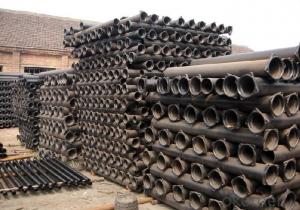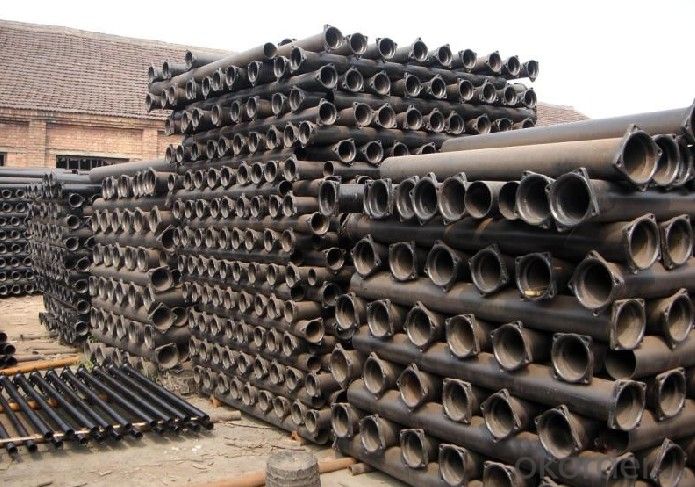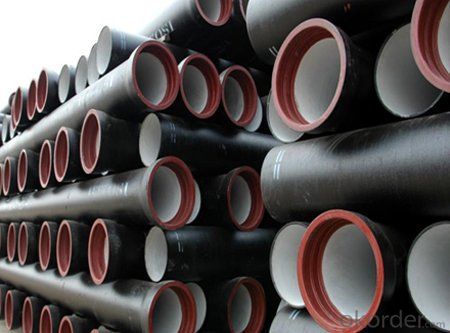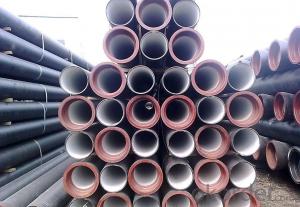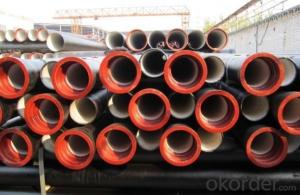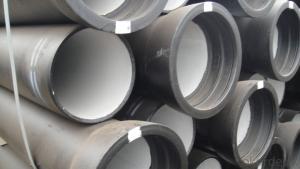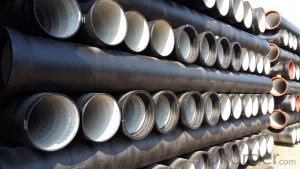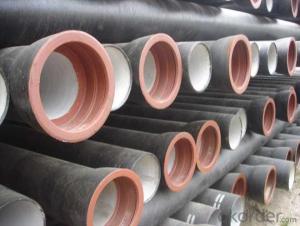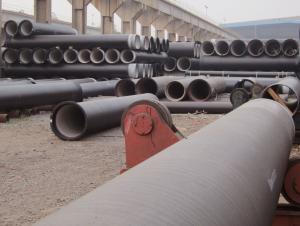Ductile Iron Pipe of China DN300-DN600 EN545/EN598/ISO2531 K9 On Sale
- Loading Port:
- China main port
- Payment Terms:
- TT or LC
- Min Order Qty:
- 22 m.t.
- Supply Capability:
- 300000 m.t./month
OKorder Service Pledge
OKorder Financial Service
You Might Also Like
1,Ductile Iron Pipe Description :
1) Pipes confirm to ISO2531,K9 class,T type joint,6m long,with inside cements lining conform to ISO4179, outside Zinc spraying(130g/m2) and bitumen coating(70μm) conform to ISO8179.
2) Pipe ends: Spigot and socket ends, with 100% SBR rubber gaskets accoding to ISO4633
3) we can do third party inspection according to customer's request.
4) Our products have been sold to many international market, such as Middle East and South East Asia and Africa.
2,Main Features of the Ductile Iron Pipe:
1).Quality guarantee
• Chemical checking
• NDE after rough machining
• Mechanical testing after heat treatment
2).Quality document
• Full Q.A document as per client request
3).Packing and Shipping
• standard export package(carton/wooden case/pallet)
• accept FOB,FAS,CNF,CIF door to door etc or customer designated shipping agent
4).Service
• Drawing: we can translate your original drawing, offer best suggestion on design
• Quality: we have full set quality control system to guarantee the best quality.
5)Inspection
• In-house Foundry
• Third party inspection available upon requirement
6) Our goal
• To be your preferred partner
3,Ductile Iron Pipe Images:
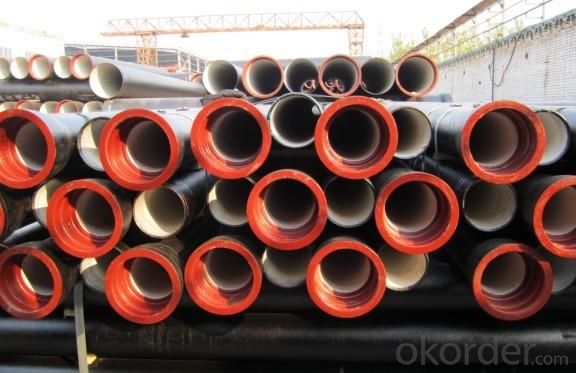
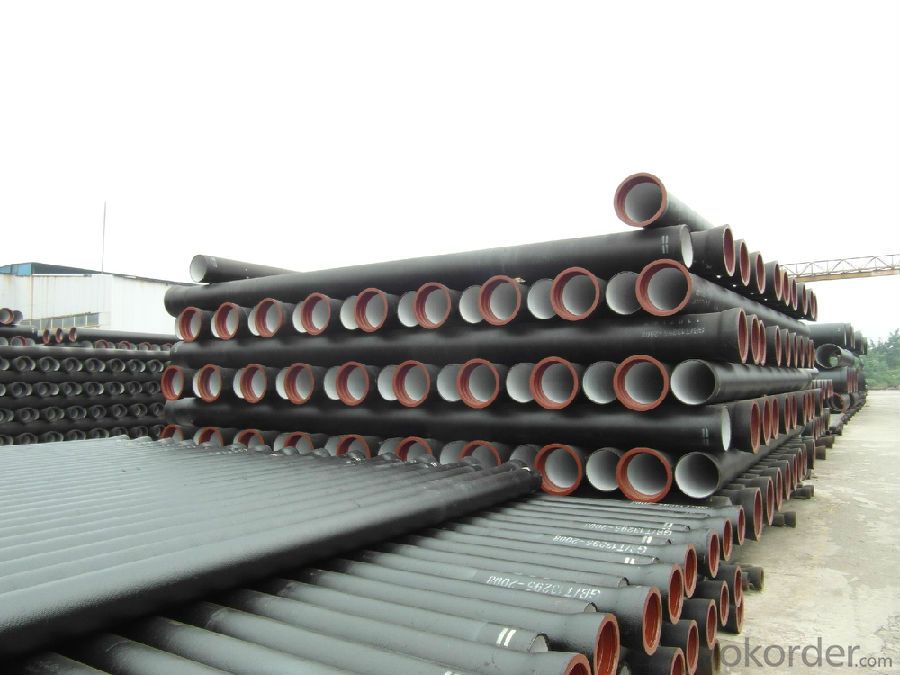
4. Ductile Iron Pipe Specification:
Place of Origin: China (Mainland)
Model Number: DN80-1600
Length: 6M/5.7M/NEGOTIATED
Standard: ISO2531 / EN545
Application: Potable/Sewage Water
Diameter: DN80-1600
Shape: Round
Hardness: 230
Pipe Wall Thickness: standerd
Pull Strength: 420
Yield (≥ MPa): 300
Material: Ductile Iron
water ductile iron pipe: SO2531 / EN545 DI pipe
5.FAQ:
We have organized several common questions for our clients,may help you sincerely:
1.Q: Why would you choose ductile iron pipe rather than other pipe materials?
A:The reasons are obvious for that not only ductile iron pipe possesses the inherent strength and flexibility of ductile
iron, combined with proven corrosion protection systems, but also the cost savings can be achieved from design to
installation and commissioning.
2.Q:Why can you guarantee the inner of pipes can’t be corroded?
A: High alumina cement mortar lining and sulphate-resistant cement mortar lining. These two special linings are applicable
to inner anti-corrosion for sewage pipes, improving resistance to erosion of the sewage components.
- Q: How do ductile iron pipes perform in high-temperature water applications?
- Ductile iron pipes perform well in high-temperature water applications due to their inherent strength and durability. They can withstand the elevated temperatures without losing their structural integrity, making them an ideal choice for conveying hot water.
- Q: How does ductile iron pipe perform in areas with high soil settlement?
- Ductile iron pipe is known for its exceptional performance in areas with high soil settlement. Due to its inherent strength and durability, it can withstand the pressures exerted by settling soil without compromising its structural integrity. The flexibility of ductile iron pipe allows it to accommodate ground movements caused by soil settlement, thus minimizing the risk of pipe failure or damage. Its ability to adapt to these movements helps prevent cracks, leaks, and breaks that could occur in more rigid pipe materials. Moreover, ductile iron pipe's strong resistance to corrosion provides an added advantage in high soil settlement areas. It can withstand the corrosive effects of the soil and other environmental factors, ensuring the longevity and reliability of the pipe system. In areas with high soil settlement, ductile iron pipe is often the preferred choice due to its ability to handle ground movements without sacrificing performance. Its strength, flexibility, and resistance to corrosion make it an ideal solution for maintaining a robust and efficient water distribution system even in challenging soil conditions.
- Q: Why is the sound speed of nodular cast iron lowered after heat treatment?
- Sound travels faster in a solid than it does in a liquidOr so, after heating, the intermolecular repulsion decreases, so that the same potential energy conduction requires molecules to move more distances, making the transmission slower
- Q: How does ductile iron pipe perform in areas with high soil erosion?
- Ductile iron pipe performs well in areas with high soil erosion due to its inherent strength and durability. Its thick walls and strong composition make it resistant to external pressures, including the erosive forces of soil. The pipe's ability to withstand the effects of soil erosion helps ensure its long-term performance and reliability in such challenging environments.
- Q: How are ductile iron pipes different from PVC pipes?
- Ductile iron pipes and PVC pipes are utilized extensively in plumbing and water distribution systems, but they differ significantly in terms of their composition and properties. Ductile iron pipes are crafted from a particular form of cast iron that contains graphite nodules, which provide the material with ductility and flexibility. Consequently, these pipes can endure high pressures and heavy loads without succumbing to breakage or cracking. Ductile iron pipes are renowned for their robustness and longevity, making them particularly suitable for underground applications and areas with substantial traffic. Conversely, PVC pipes are constructed from a plastic known as polyvinyl chloride. These pipes possess rigidity and lack the same level of strength as ductile iron pipes. PVC pipes are commonly employed in low-pressure scenarios, such as residential plumbing systems, irrigation, and drainage systems. These pipes are lightweight, easy to install, and resistant to corrosion, rendering them a favored option for residential and non-industrial purposes. The cost disparity between ductile iron pipes and PVC pipes represents another distinction. Due to higher material and production expenses, ductile iron pipes tend to be pricier. Conversely, PVC pipes are relatively inexpensive to manufacture, making them a cost-effective choice for numerous plumbing projects. In summary, the primary disparities between ductile iron pipes and PVC pipes involve their composition, strength, flexibility, and cost. Ductile iron pipes, formed from cast iron, are celebrated for their strength and durability, while PVC pipes, formed from plastic, are lighter and more cost-effective. The selection between these two types of pipes depends on the specific demands of the plumbing project, including pressure, load-bearing capacity, and budgetary considerations.
- Q: How does ductile iron pipe handle soil movement?
- Ductile iron pipe possesses exceptional strength and durability, making it highly effective in managing soil movement. When the surrounding soil shifts or settles, ductile iron pipes can flex and adapt to this movement without compromising their structural integrity. The ability of ductile iron pipes to handle soil movement stems from their inherent capacity to endure bending and stretching. They have a remarkable level of flexibility, allowing them to adjust to ground shifts and settle without experiencing any breakage or cracks. This flexibility arises from the distinctive material properties of ductile iron, a type of cast iron that has been treated with magnesium to enhance its strength and elasticity. Furthermore, ductile iron pipes are constructed with a thick wall, which enhances their resistance against soil movement. This robust construction assists in distributing the forces exerted by the shifting soil, minimizing the impact on the pipe and preventing significant damage. Moreover, ductile iron pipes are typically installed with suitable bedding and backfill materials to provide additional support and stability. This involves using compacted soil or engineered granular materials around the pipe, which helps evenly distribute the load and reduces the potential for soil movement. Overall, ductile iron pipe is an excellent choice for areas with high soil movement, such as regions with expansive or unstable soils. Its flexibility, strength, and proper installation techniques enable it to effectively handle the challenges presented by soil movement, ensuring long-lasting and dependable performance in various applications.
- Q: What is the average diameter range of ductile iron pipes?
- The diameter of ductile iron pipes can vary depending on the application and industry standards. In general, there is a wide range of diameters available to meet different requirements. Ductile iron pipes can start from as small as 4 inches (100 mm) and go up to 64 inches (1600 mm) or even larger. These sizes are commonly used for water distribution, sewer systems, and infrastructure projects. It is important to consider factors such as local regulations, project specifications, and engineering considerations when determining the appropriate diameter range. Consult industry standards and relevant authorities for specific applications.
- Q: Are ductile iron pipes resistant to hydrogen sulfide corrosion?
- Yes, ductile iron pipes are generally resistant to hydrogen sulfide corrosion. Ductile iron is a type of cast iron that has been treated with magnesium to create a more flexible and durable material. This treatment significantly enhances its resistance to corrosion, including corrosion caused by hydrogen sulfide. The magnesium in the ductile iron forms a protective layer on the surface, preventing the penetration of hydrogen sulfide and other corrosive agents. However, it is important to note that the resistance of ductile iron pipes to hydrogen sulfide corrosion can still be influenced by factors such as the concentration and duration of exposure to the corrosive environment. Therefore, proper maintenance, regular inspection, and appropriate protective measures should still be implemented to ensure the long-term durability and performance of ductile iron pipes in the presence of hydrogen sulfide.
- Q: What is the expected sound transmission loss of ductile iron pipes?
- The sound transmission loss of ductile iron pipes can vary depending on factors like pipe thickness, diameter, and the surrounding environment. Generally, ductile iron pipes have good soundproofing properties because they are dense and heavy. They are designed to minimize noise transmission and vibration. Ductile iron pipes can significantly reduce noise transmission. The material's density and mass block sound waves and reduce their transmission. However, it is important to note that the sound transmission loss of ductile iron pipes may not be as high as other specialized soundproofing materials like acoustic insulation or double-wall piping systems. To accurately determine the expected sound transmission loss of ductile iron pipes in a specific application, it is recommended to consult the manufacturer's specifications or conduct acoustic tests following relevant standards like ASTM E90. These tests can provide precise data on the sound transmission loss values of ductile iron pipes under different conditions, ensuring proper noise control and acoustic performance in specific installations.
- Q: Can ductile iron pipes be used for underground river crossings?
- Underground river crossings can indeed utilize ductile iron pipes. Renowned for their robustness and longevity, ductile iron pipes are highly versatile, making them ideal for a range of applications, including underground river crossings. These pipes possess exceptional tensile strength, enabling them to withstand the external forces and pressures imposed by the surrounding soil and water. Moreover, their outstanding resistance to corrosion is paramount when dealing with subterranean water sources like rivers. Additionally, ductile iron pipes can endure ground movements, settling, and any geological obstacles that may arise during the installation and operation of underground river crossings. Consequently, they represent a dependable choice, ensuring the secure and efficient conveyance of water across rivers while preserving the integrity of the subterranean infrastructure.
Send your message to us
Ductile Iron Pipe of China DN300-DN600 EN545/EN598/ISO2531 K9 On Sale
- Loading Port:
- China main port
- Payment Terms:
- TT or LC
- Min Order Qty:
- 22 m.t.
- Supply Capability:
- 300000 m.t./month
OKorder Service Pledge
OKorder Financial Service
Similar products
Hot products
Hot Searches
Related keywords
